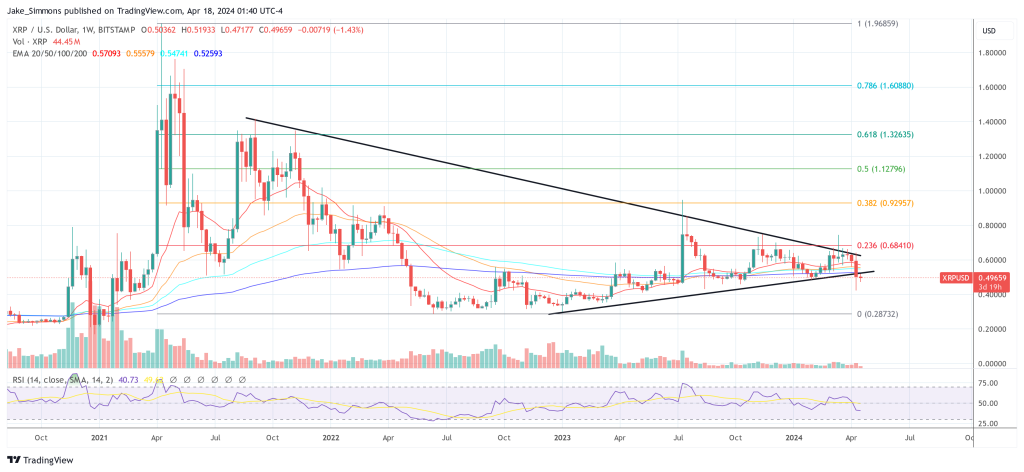The dispute between Ripple Labs and the US Securities and Exchange Commission (SEC) regarding the classification of XRP as a security is expected to reach the US Supreme Court, with this possibility becoming more likely following a recent court decision in the Coinbase case. This judgment, presided over by Judge Katherine Failla from the Southern District of New York, favored the SEC.
XRP Lawsuit Going To The US Supreme Court?
At a recent discussion held at Columbia Business School, Ladan Stewart, who previously led the Securities and Exchange Commission’s (SEC) crypto litigation unit, shared valuable insights into the regulatory standpoint and future plans of the SEC in relation to cryptocurrencies. Though Stewart has since departed from the SEC, her remarks continue to highlight her extensive knowledge and understanding of the agency’s approaches, and the potential impact on the crypto sector as a whole.
At the discussion, Stewart expressed his recognition of Judge Failla’s influence on the Coinbase case verdict, remarking, “This decision may provide the SEC with the confidence it requires to move forward,” and emphasized that the regulatory body “has no intention of shying away from filing crypto-related enforcement actions.”
Significantly, she pointed out that one of the lawsuits against companies such as Ripple and Coinbase could potentially reach the Supreme Court, providing much-needed resolution regarding the crypto industry’s securities definition, according to Fortune. “This will bring a clear answer to that issue,” Stewart added.
The conversation delved into the wider consequences of how digital assets are classified under US law, bringing up ongoing debates about whether the tokens themselves are securities or if it’s the way they’re sold that establishes an investment contract. Stewart explained, “The base asset isn’t a security, but rather the method of its offering and selling is.”
Panelists including Rebecca Rettig from Polygon and Lewis Cohen from DLx Law provided contrasting views. Rettig, legal counsel for Polygon, pressed Stewart on practical implications, specifically asking, “But then what do you register?” Stewart’s response that both the token and “all the stuff around the token” are considered for security status, did not satisfy panelists, highlighting a persistent area of contention between the crypto industry and regulatory bodies.
Lewis Cohen from DLx Law expressed concerns that the SEC’s way of enforcing regulations could result in “regulation through enforcement,” a point frequently made by crypto supporters. Cohen raised doubts about the feasibility of applying securities laws, as ruled by Judge Failla in the recent Coinbase case, to digital asset markets.
The debate highlighted a significant challenge for crypto businesses: navigating legal requirements that are uncertain or difficult to implement. This issue continues to fuel disagreements and shapes the wider conversation on crypto regulations.
In simpler terms, Stewart’s remarks at the end of the event emphasized the respectful but intense discussions among participants. She reiterated, “We’re all on good terms,” signifying a polite yet clear recognition of the ongoing debates that will significantly influence crypto regulations in the US.
Ripple’s CEO, Garlinghouse, has made it clear in the past that his company is determined to challenge the Securities and Exchange Commission (SEC) regarding the classification of XRP. He stated, “We’re in this until the end.” Furthermore, Ripple’s Chief Legal Officer, Alderoty, mentioned last year that the Supreme Court has frequently ruled against the SEC in recent cases.
At press time, XRP traded at $0.49659.

Read More
- SOL PREDICTION. SOL cryptocurrency
- BTC PREDICTION. BTC cryptocurrency
- USD ZAR PREDICTION
- USD CLP PREDICTION
- CKB PREDICTION. CKB cryptocurrency
- BICO PREDICTION. BICO cryptocurrency
- SEILOR PREDICTION. SEILOR cryptocurrency
- LUNC PREDICTION. LUNC cryptocurrency
- BLACK PREDICTION. BLACK cryptocurrency
- FJO PREDICTION. FJO cryptocurrency
2024-04-18 09:41